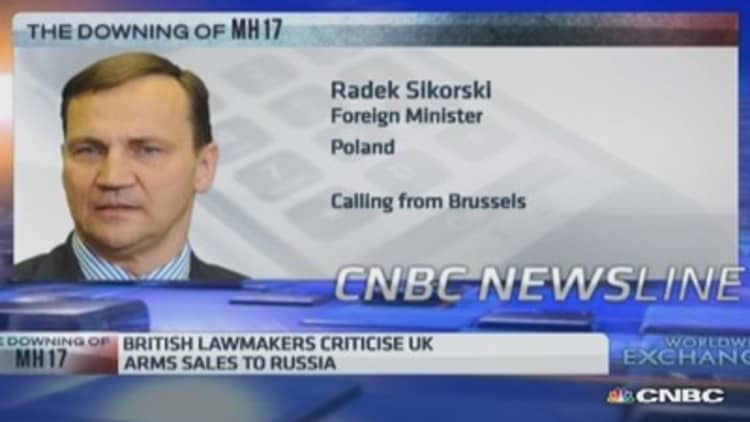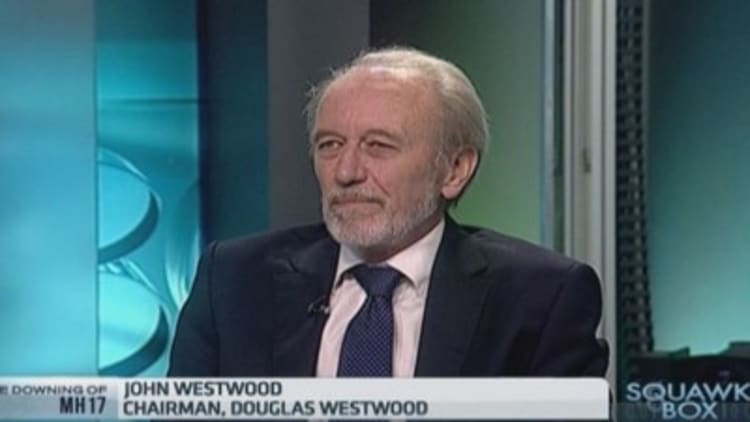Even before tougher sanctions against Russia hit the books, the country is facing potential hits as investors turn their backs on its financial assets.
"With access to foreign capital likely to become more restrictive, the pick-up in investment needed to revive Russia's ailing economy is starting to look ever more unlikely," Neil Shearing, chief emerging markets economist at Capital Economics, said in a note Thursday.
Read More US says Russia firing artillery across border at Ukrainian military
Russia also faces the risk that threats of further sanctions could spur more capital outflows, he said.
Following the crash of Malaysia Airlines Flight MH17, believed to be downed by a surface-to-air missile, in territory controlled by pro-Russian separatists last week, both the U.S. and the EU are weighing sweeping new sanctions against Russia. The proposals include a potential ban on all Europeans purchasing any new debt or stock from the country's largest banks, but not on Russian sovereign debt, according to a Financial Times report.

Some investors have already taken concerns over sanctions to heart. Nomura closed out its positions in the local bond market and Russian credit, with some losses expected, the bank said in a note earlier this week.
"We now expect the story to shift to sovereign risk from stagflation and disinflation as investors assess whether they should be invested in Russia at all," Nomura said.
Read More Stockman: Russia could be the next black swan
It believes the risk of "level three" sanctions, which would expand the number of affected companies and the scope of restrictions, has risen significantly and could be a systemic concern.
According to Societe Generale, ratcheting up to level three would likely tip Russia's already weak economy into a full-blown recession. In the second quarter, Russia's economy grew just 1.2 percent from a year earlier, and is forecast to expand just 0.5 percent for the full year, the bank said in a note this week.
"The ongoing climate of uncertainty is already coming at a high cost," with $74.4 billion exiting this year and foreign direct investment sharply down, Societe Generale said.
Read More
To be sure, Capital Economics doesn't expect the government itself to face much difficulty balancing its checkbook, despite canceling nine bond auctions so far this year, including one this week due to "unfavorable market conditions."
While Russia had a small budget deficit of 0.5 percent of gross domestic product (GDP) last year, it's likely to balance the books this year as a weaker ruble raised the local currency value of its U.S. dollar-denominated oil revenues, Shearing said.

Additionally, despite the cancellations, the government still had 17 successful ruble bond auctions this year and its relatively low external debt burden of around $3 billion in repayments this year can easily be funded from its $480 billion of foreign exchange reserves, Shearing said.
The real concern is with Russia's companies and banks, which face around $83 billion in external debt repayments by the end of the year, he noted.
Read More Backfire? How Russia sanctions could hit Europe
"Unlike the government, most firms do not have large external assets to fall back on," he said, but he noted the government may step in to assist any systemically important companies.
Over the past week, Russia's corporate bonds within the Emerging Market Corporate Index have seen their yields rise around 79 basis points, according to data from Barclays. Bond yields move inversely to prices.
Still, not everyone is equally bearish over the impact of sanctions on Russian corporate finances.
"In general, companies have a strong financial position and good liquidity. The country and the large corporations should be able to deal with the situation, even if further sanctions are imposed (assuming oil and gas still flows to the Western world and China absorbs other commodities from Russia)," Emiliano Surballe, a fixed income analyst at Julius Baer, said. But the bank is advising sticking to relatively short duration of up to four years in the strongest corporates.
Read More Merkel talks tough, but can Europe back it up?
Barclays also isn't advising joining an exit from Russian sovereigns, keeping a neutral call in its emerging market credit portfolio and a recommendation to buy Russia's 2030 bonds. While the geopolitical concerns in Russia are a "clear negative" for the country's credit markets, Barclays expects most investors to stay neutral.
"Investors seem caught between the risk of any potential legal ramifications of further sanctions and cheap valuations (the latter notwithstanding the adverse long-term economic implications of the sanctions for the Russian economy)," it said.
—By CNBC.Com's Leslie Shaffer; Follow her on Twitter @LeslieShaffer1

